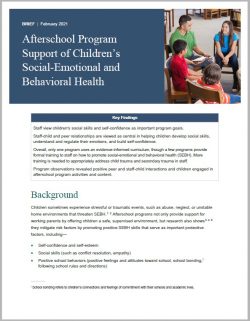Afterschool Programs’ Support of Children’s Social-Emotional and Behavioral Health
- Authors:
- Mariel Sparr
- Patrice Cachat
- Todd Bartko
- Jill Filene
- Stacy Frazier
This brief presents case study research indicating that afterschool programs see children’s social skills and self-confidence as important program goals.
 Staff-child relationships and peer relationships are viewed as central in helping children develop social skills, understand and regulate their emotions, and build self-confidence. Program observations revealed positive peer and staff-child interactions and engagement of children in activities and content. Overall, only a few programs use an evidence-informed curriculum and provide formal training to staff on how to promote social-emotional and behavioral health. More training is needed to appropriately address child trauma and secondary trauma in staff.
Staff-child relationships and peer relationships are viewed as central in helping children develop social skills, understand and regulate their emotions, and build self-confidence. Program observations revealed positive peer and staff-child interactions and engagement of children in activities and content. Overall, only a few programs use an evidence-informed curriculum and provide formal training to staff on how to promote social-emotional and behavioral health. More training is needed to appropriately address child trauma and secondary trauma in staff.
A collaboration by the U.S. Department of Health and Human Services Office of the Assistant Secretary for Planning and Evaluation and Office of Women’s Health, the Improving Programs, Policies, and Services to Promote Healthy Development in Middle Childhood in Afterschool Settings project examined how relevant federal investments support local efforts. The study focused on the extent to which evidence-based interventions are implemented in afterschool programs; promising practices for administering, improving, and sustaining these interventions; and how programs can better address the needs of boys and girls.

